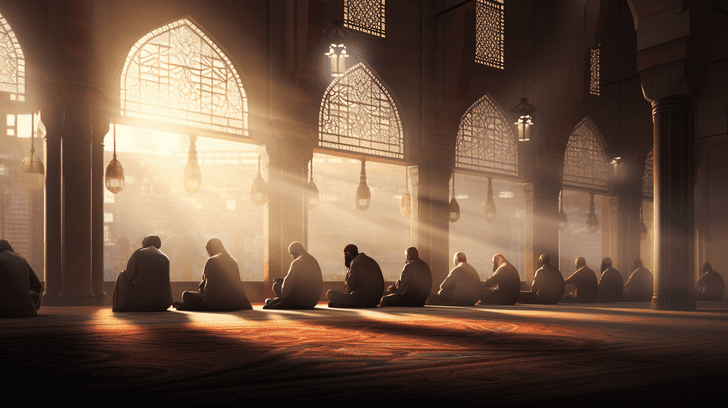Do you ever wonder how Muslims observe the Sabbath?
Well, let’s take a moment to explore the Muslim Sabbath rules.
On this holy day, known as Jummah, Muslims are prohibited from working and are encouraged to engage in religious activities.
For instance, they gather for Jummah prayers at the mosque, where they perform specific rituals and listen to a sermon.
It is also a time for Muslims to reconnect with their families and spend quality time together.
Moreover, acts of charity and community service are highly encouraged on this day, as it promotes kindness and compassion towards others.
Key Takeaways
- Muslims observe the Sabbath on Friday, a day dedicated to religious activities and reconnecting with family and community.
- Work and business transactions are prohibited on the Muslim Sabbath, emphasizing the importance of rest, worship, and self-reflection.
- During Jummah prayers, Muslims adhere to modest dress code, recite specific chapters and verses from the Quran, and seek guidance and spiritual nourishment.
Importance of Jummah in Islam
The Jummah prayer holds immense significance in Islam. It’s a congregational prayer that Muslims gather to perform every Friday in mosques around the world.
Friday worship also holds a spiritual significance in Islam. It’s believed that on this day, Allah showers His blessings and mercy upon the believers. The Jummah prayer serves as a means of seeking forgiveness, guidance, and blessings from Allah.
It’s a time for reflection, repentance, and renewal of faith. The spiritual significance of Friday worship can’t be understated, as it serves as a reminder for Muslims to prioritize their relationship with Allah and strive for spiritual growth.
Prohibition of Work on the Muslim Sabbath
Observing the Muslim Sabbath entails abstaining from work, a practice that holds great importance in the Islamic faith. This prohibition of work on the Muslim Sabbath extends to business transactions as well.
The concept of rest and reflection is deeply ingrained in Islamic teachings, and the Muslim Sabbath provides an opportunity for believers to disconnect from the hustle of daily life and focus on spiritual growth.
By refraining from work and business transactions, Muslims are able to dedicate this special day to worship, prayer, and self-reflection.
It serves as a reminder of the importance of prioritizing spiritual well-being and seeking inner peace.
This prohibition reinforces the belief that material pursuits shouldn’t overshadow one’s spiritual journey and serves as a means of fostering a deeper connection with God.
Rituals and Practices During Jummah Prayers
During Jummah prayers, believers actively participate in the rituals and practices. One important aspect of Jummah prayer is adhering to the dress code.
It’s recommended to dress modestly, covering the body appropriately, and avoiding flashy or revealing clothing. This is to show respect and reverence for the sacredness of the occasion.
Another significant practice during Jummah prayer is the recitation of the Quran. The recitation of specific chapters and verses from the Quran is an integral part of the Friday prayer.
It’s a means of seeking guidance, connecting with the divine, and gaining spiritual nourishment. The recitation is usually led by the imam, and the congregation follows along, listening attentively and reflecting on the words of the Quran.
Spending Time With Family on the Holy Day
To fully embrace the significance of Jummah prayers, actively participating in the rituals and practices also extends to spending quality time with family on this holy day.
Family bonding is a central aspect of Islam, and the Sabbath provides an opportunity for strengthening these ties. It’s a time to come together, share meals, engage in meaningful conversations, and simply enjoy each other’s company.
Quality time with family not only nourishes the emotional well-being of individuals but also creates a sense of unity and harmony within the household.
Acts of Charity and Community Service on Jummah
People of muslim faith engage in acts of charity and community service on Jummah to make a positive impact on those in need.
Jummah, the Muslim holy day, provides a special opportunity to practice these virtues and contribute to the well-being of the community. By engaging in acts of charity, such as donating money, food, or clothing, you can alleviate the suffering of those less fortunate.
Volunteering your time at local shelters, hospitals, or community centers is another way to make a meaningful difference. These acts of service not only provide assistance to those in need but also foster a sense of unity and compassion within the community.
Conclusion
In conclusion, observing the Muslim Sabbath, known as Jummah, holds significant importance in Islam.
The prohibition of work on this day allows individuals to focus on their spiritual well-being and reconnect with their families.
It also encourages acts of charity and community service, promoting a sense of compassion and unity within the Muslim community.
As a comparison with the Biblical Sabbath, and with the spirit of the Sabbath observance, we can see that our muslim friends are also following similar practices for the holy day of God.
We pray that God may open their eyes to discover the real Sabbath, which is Saturday, the seventh day according to the Bible!
It is this day that was blessed and sanctified by God, after the six literal creation days! (Genesis 2:2-3).
Contrary to popular belief that the Sabbath was made only for the Jewish people, we encourage everyone whether of any religious denomination to meditate on the following verse:
And he said unto them, The sabbath was made for man, and not man for the sabbath:
Mark 2:27
The Sabbath is for everyone! God calls everyone today to accept His gift in His Son Jesus Christ that died on the cross for our sins!
If we love Him, we are also to keep His commandments, including the Sabbath! (John 14:15).
Jesus says that He is the Way, the Truth, and the Life! (John 14:6)
O taste and see that the LORD is good: blessed is the man that trusteth in him.
Psalm 34:8
My Letter To A Sunday Keeper – Sabbath Documentary

The Days of Noah – Powerful Documentary (Video Format)

Bible Studies – Written Format







